#Vice President Agnew
Explore tagged Tumblr posts
Text
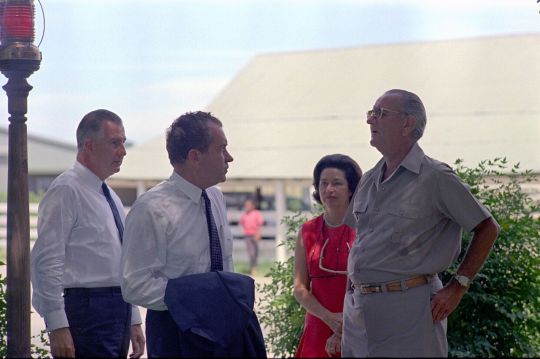
"I really would have enjoyed serving in the Vice Presidency with Lyndon Johnson, because if anything had gone wrong, probably he himself would have picked up the phone and said, 'Agnew, what the hell are you doing?' Or he would have said, 'I've got a hell of a problem. Come over here. I want to talk to you about this.'
Unfortunately, I could have no such man-to-man talk with President Nixon. Absolutely none. I was never allowed to come close enough to participate with him directly in any decision. Every time I went to see him and raised a subject for discussion, he would begin a rambling, time-consuming monologue. Then finally the phone would ring or [White House Chief of Staff H.R. "Bob"] Haldeman would come in, and there would be no time left for what I really had come to talk about. He successfully avoided any subject he didn't want to be pinned down on. He preferred keeping his decision-making within a very small group. I was not of the inner circle."
-- Former Vice President Spiro Agnew, on his frustration with how far President Richard Nixon would go in order to avoid any sort of uncomfortable discussion or personal confrontation in one-on-one meetings with each other, in Agnew's book, "Go Quietly...or else", 1980
#History#Presidents#Richard Nixon#President Nixon#Nixon Administration#Spiro Agnew#Vice President Agnew#Vice Presidents#Vice Presidency#Politics#Political History#Political Rivals#Political Rivalries#Lyndon B. Johnson#LBJ#President Johnson#Presidential History#Vice Presidential History#Presidential Rivalries#Presidential Rivals#“Go Quietly...or else”
21 notes
·
View notes
Text
Inspired by @anteabbie’s telling presidents on characterai that she’s pregnant…. Veeps!
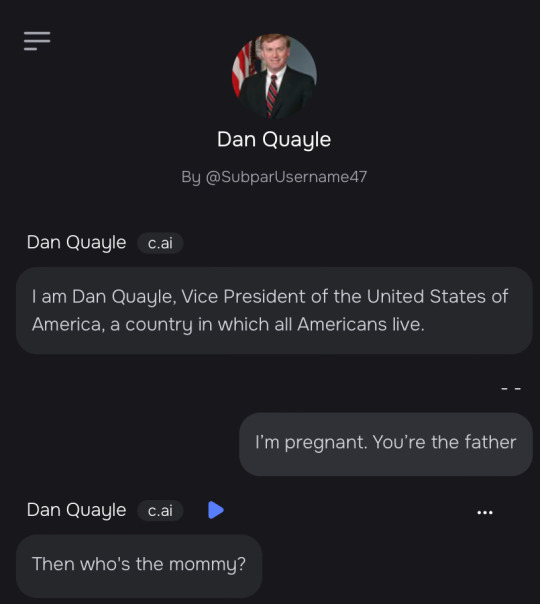
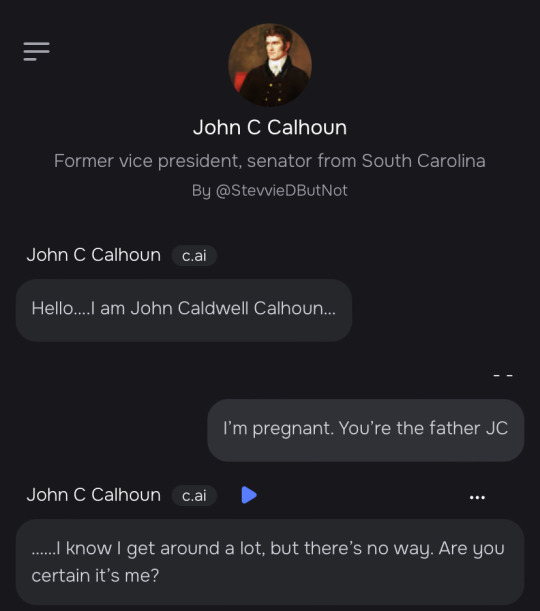


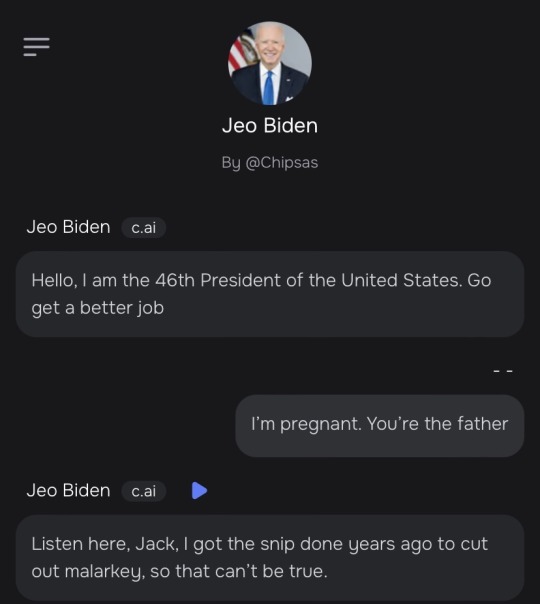
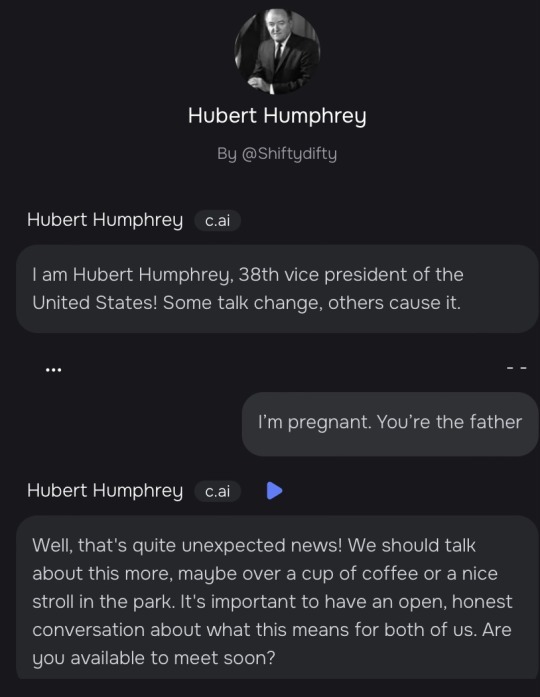
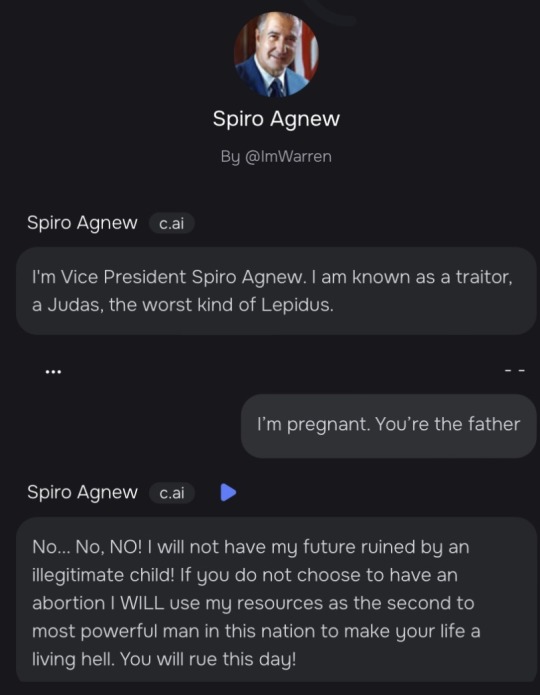

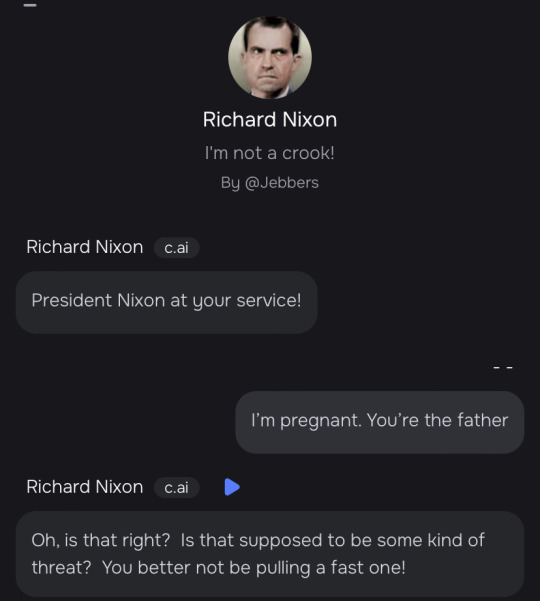

#vice presidents#john c calhoun#dan quayle#thomas marshall#spiro agnew#richard nixon#dick cheney#lyndon b. johnson#joe biden#walter mondale#hubert humphrey#Dan Quayle does not understand how this works but okay
169 notes
·
View notes
Text
why are all the beautiful women i follow always talking about spiro agnew?
19 notes
·
View notes
Link
From the October 28, 2024 opinion piece by Harlan Ullman, a senior advisor at the Atlantic Council and the prime author of the “shock and awe” military doctrine:
Why Donald Trump selected Sen. JD Vance (R-Ohio) as his running mate is still unknown. What did Trump see in Vance, who once called the former president “America’s Hitler” and unfit for the presidency? And what caused this transformation?
...
Trump of course may have had other motivations for choosing Vance as opposed to a more recognizable ally... That motivation could have been derived from a little history and Richard Nixon’s 1968 campaign.
Whom did Nixon choose as his vice president? Most Americans will not recall Spiro Agnew, the disgraced former governor of Maryland. Agnew had a modest resume, serving as a Maryland county executive and governor until he was selected to become the nation’s 39th vice president.
...
One reason Nixon had selected Agnew was as an insurance policy against a potential impeachment and conviction removing him from the presidency.
Simply put, who would accept Agnew as president in the middle of the Cold War and with Vietnam still raging? Had Agnew and not Gerald Ford been vice president in 1974, would Nixon have resigned over Watergate? If he had been impeached, would the Senate have convicted him? Those would have been interesting questions.
...
With Vance as vice president, does the Spiro Agnew model apply?
In the Senate, where Vance was not popular with everyone, is a convicted Trump better in the White House than a young, unpopular vice president? One can wonder. But of all the reasons why Trump picked Vance from a fairly robust bench, an insurance policy makes some sense.
0 notes
Text
How Presidential Running Mates Can Make or Break a Campaign! Four Times Candidates’ Second-in-Command Picks Surprised Everyone
— September 18, 2024 | American Experience
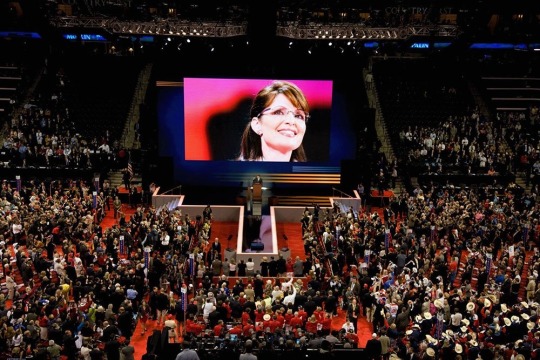
Vice Presidential candidate Sarah Palin on the big screen at the Republican National Convention in St. Paul, Minnesota, September 3, 2008. Photo by Carol M. Highsmith, Library of Congress.
Every four years, the news media engage in endless speculation about the identities of presidential candidates’ running mates. The process is so enshrined, in fact, that it even has a name: Veepstakes.
Often the choice is predictable. Sometimes, though, there are VP shockers—running mate picks that no one, even the most astute political analysts, saw coming. Those surprise picks can be a huge boon to a campaign, building notoriety and momentum—or they can backfire, sending a candidate’s run into a tailspin. Here are a few of modern history’s most dramatic Veepstakes outcomes.
Sarah Palin (Sarah Louise Palin)
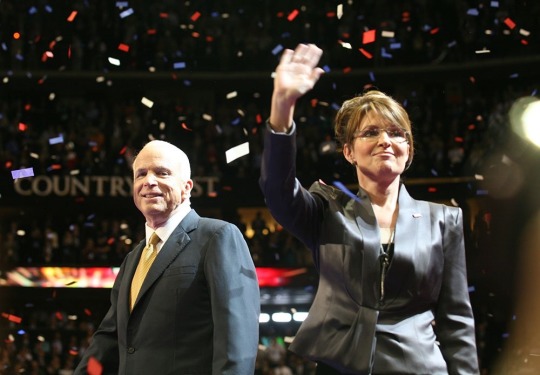
John McCain and Sarah Palin at the Republican National Convention, September 4, 2008. Photo credit Tom LeGro, PBS NewsHour.
John McCain was behind in the polls against fellow Senator Barack Obama in 2008 when he made his surprising VP pick: small town mayor-turned-Alaska governor Sarah Palin, a choice no one predicted.
At first, public perception suggested McCain had made a bold choice with a political outsider whose gender, youth, and more conservative ideology helped balance the Republican ticket. McCain’s campaign raised record amounts and his poll numbers skyrocketed. However, it wasn’t long before Palin’s inexperience and lack of preparation came through in interviews and debates.
As the election season progressed, public opinion of Palin turned increasingly negative, and later analysis showed that she potentially cost the McCain campaign millions of votes—a significant margin in a close race like 2008.
Thomas Eagleton (Thomas Francis Eagleton)
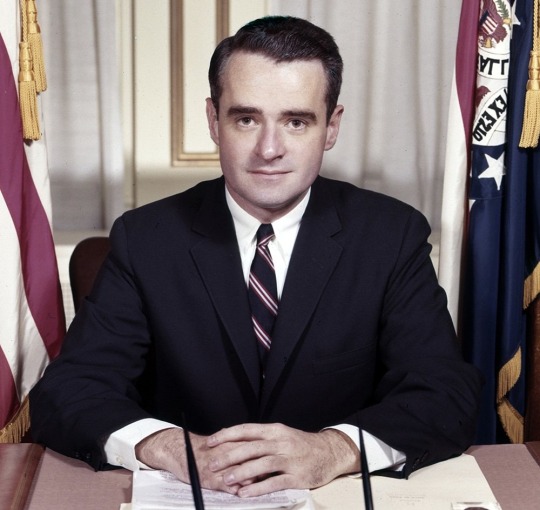
An official portrait of Thomas Eagleton as Missouri’s Lieutenant Governor, 1967. Photo courtesy of Missouri State Archives.
In July 1972, Democratic candidate George McGovern announced his running mate: Missouri Senator Thomas Eagleton, a rising young political star whose anti-abortion views balanced McGovern’s ticket—or so the campaign hoped. Only 18 days later, things looked very different.
Right after the Democratic National Convention ended, news emerged about Eagleton’s medical history: three times during the 1960s he had been hospitalized for depression, and received electroshock treatment. McGovern stood by his choice at first, but political pressure mounted.
Ultimately, McGovern replaced Eagleton with former Peace Corps director Sargeant Shriver. (The only other time in American history that a VP candidate had been removed from the ticket was in 1912, when President William Howard Taft replaced acting vice president James Sherman—and only because Sherman had died six days before the election. Spoiler: that presidential bid lost.)
McGovern’s campaign also never recovered from the last-minute switch, ultimately losing the election by the largest landslide in U.S. history. The scandal also forever changed the way potential VPs were vetted going forward, typically leading campaigns to do far more comprehensive research.
Spiro Agnew (Spiro Theodore Agnew)
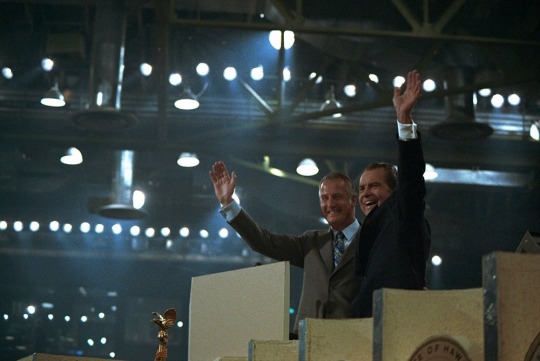
Vice President Spiro Agnew and President Richard Nixon at the Republican National Convention, August 23, 1972. Photo courtesy National Archives and Records Administration.
In August 1968, presidential hopeful Richard Nixon made a 1 a.m. announcement about his vice presidential choice. Spiro Agnew was an unknown on no one’s list, a former county elected official in Maryland who had only been governor for two years.
At first, Agnew’s name became a campaign punchline. But Nixon’s choice proved smart. Positioned together on the Republican ticket as law-and-order candidates, Nixon and Agnew won the popular vote by a small margin but took the electoral college by 110 votes.
Once in office, Agnew did such a good job of reinforcing the president’s rhetoric that he became known as “Nixon’s Nixon.” But ultimately, the copycat routine went too far: just before the Watergate scandal ended Nixon’s presidency, Agnew himself stepped down to avoid his own separate charges of bribery, extortion, and tax fraud, becoming only the second U.S. vice president in history to resign.
Al Gore (Albert Arnold Gore Jr.)
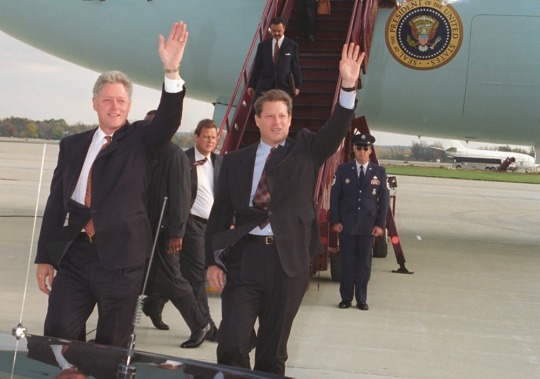
President Clinton and Vice President Al Gore disembark from Air Force One, October 20, 1995. Photo by Sharon Farmer, National Archives and Records Administration.
Conventional wisdom says presidential candidates should balance the ticket by choosing VPs who compliment them around various demographics, like age, identity, geography, and ideology. But in 1992, Bill Clinton threw decades of political strategy out the window and chose a running mate who was practically his mirror image.
Senator Al Gore was almost the exact same age as Clinton, also southern, and a centrist Democrat. In fact, Gore was so similar to the presidential candidate that Republicans dubbed him “Clinton’s tax-and-spend brother.” Gore was reportedly selected from a list of 40 potential candidates, with Clinton’s key considerations being that his running mate share his values, be prepared to serve as president immediately, and have the stamina required for a long, hard campaign.
It paid off. Together Clinton and Gore’s youthful energy carried the first all-baby-boomer presidential ticket to a big electoral college win, proving that sometimes doubling down is a savvy strategy.

President Richard Nixon meeting with Rep. Gerald Ford in the Oval Office the day before announcing Ford as his pick for Vice President in 1973. Credit: The Richard Nixon Presidential Library and Museum. National Archives and Records Administration
#American Experience#United States 🇺🇸 | Presidential Running Mates#Make or Break#Campaign#Second-in-Command#Surprised Picks#Sarah Palin#Thomas Eagleton#Spiro Agnew#Al Gore#The American Vice President#Article
0 notes
Note
How do I write mean insults that's in character for a character to say? I'm personally poor at coming up with insults that don't sound generic or would actually cut deep, being mean in general. I want to write a snarky character with a dry sense of humour when it calls for it but don't know how to go about it.
He's also recovering from a superiority and inferiority complex.
As the writer, you know your character best, and what insults would make sense for them to say (also considering the bigger context of the scene). So, I'll just provide you with a compilation of prompts and notes from different sources, and you can choose which ones are most appropriate to incorporate in your story.
Writing Notes: Insults & Dry Humor
A List of "Sophisticated" Insults
Craven - having or showing a complete lack of courage; very cowardly
Fatuous - silly or stupid; complacently or inanely foolish. From Latin infatuate, which once meant "to make foolish," but which now usually means "to inspire with foolish love or admiration."
Insipid - not interesting or exciting; dull or boring
Obstreperous - difficult to control and often noisy
Obtuse - stupid or unintelligent; not able to think clearly or to understand what is obvious or simple
Pusillanimous - weak and afraid of danger. It's been used by such notables as Ralph Waldo Emerson ("It is a pusillanimous desertion of our work to gaze after our neighbours"), and the disgraced Vice-President Spiro Agnew, who called journalists "pusillanimous pussyfooters."
Sanctimonious - pretending to be morally better than other people. It once meant "possessing sanctity; holy, sacred." The genuinely holy aspect faded, and William Shakespeare is credited with first using sanctimonious to mean "hypocritically pious or devout."
Twee - sweet or cute in a way that is silly or sentimental. Just as buddy is believed to be a baby talk alteration of "brother", twee is a baby talk alteration of "sweet". Although twee is still considered a chiefly British term, it's increasingly popular in American English.
Unctuous - revealing or marked by a smug, ingratiating, and false earnestness or spirituality. Unction can mean "anointment" or it can name something used to anoint, such as a soothing or lubricating oil. That idea of oiliness led to unctuous, which can describe the slickness of false sincerity.
Vacuous - having or showing a lack of intelligence or serious thought; lacking meaning, importance, or substance
The insult would also depend on which other character it is directed at. Here is a list of "funny" insults for adults from Reader's Digest:
My days of not taking you seriously have come to a middle.
You are the human equivalent of a participation trophy.
If you were a spice, you’d be flour.
You may have a sparsely attended funeral.
I smell something burning. Are you trying to think again?
You’re like a lighthouse in a desert: bright but not very useful.
Don’t worry—the first 30 years of childhood are always the hardest.
May your life be as pleasant as you are.
You’re as useless as the “ueue” in “queue.”
Your face is just fine. It’s your personality that’s the issue.
...and for your character's significant other:
I like you. People say I have no taste, but I like you.
You continue to meet my expectations.
I’ll never forget the first time we met. But I’ll keep trying.
If genius skips a generation, our kids will be brilliant.
We were happily married for a month. Too bad it’s our 10-year anniversary.
I admire the way you try so hard.
You’re entitled to your incorrect opinion.
Have you tried doing it the way I told you to the first time?
The best part of watching a show with you is when you fall asleep because then I can watch my show.
Don’t call me crazy—you’re the one who married me!
You can always alter these to better suit your character. You can read the full list here, which also includes some insults for kids, best friends, and family.
Tips for Better Humor Writing
Humor writing isn’t all about landing a good joke (except for when it is). In creative writing, the effect is usually a bit more nuanced. Here’s a few writing techniques to get you started:
Subvert expectations. Try to undermine the audience’s expectations or reform them with structural elements.
Save the best for last. Humor is often a release of tension, so the sentence builds that tension, and the pay-off—the punchline—happens most naturally at the end. This is also sometimes referred to as the “rule of three,” where two thoughts act as a build-up to the final humorous closer.
Use contrast. Are your characters in a terrifying situation? Add something light, like a man obsessing about his briefcase instead of the T-Rex looming behind him.
Use good wordplay. Sometimes words themselves are funny, and just as often, their placement in a sentence can make a difference. Some words are just funnier than others, so make a list of those that amuse you the most.
Take advantage of cliché. While clichés are something most writers try to avoid, it’s important to recognize them,so you can use them to your advantage. Humor relies in part on twisting a cliché—transforming or undermining it. You do this by setting up an expectation based on the cliché and then providing a surprise outcome. In humor writing, this process is called reforming.
Use humor as a counterbalance. If you just pile on one terrible thing after another, it starts to become ridiculous, and people won’t buy it. Using humor is a great way to achieve the proper balance between fantasy and real life. Remember, if a roller coaster only did twists and turns the whole time, it wouldn’t be as fun to ride.
Level of Intensity
There are people who shrug off an insult (“That’s just the way she is”) and people who commit murder over an insult (“I’m avenging my honor!”). Plus, of course, everything in between. Which is your character?
To be believable, consider the following:
Personality. How hard does your character take events in general? Does s/he get really excited over good fortune and really depressed over setbacks? Then we’ll find it believable that s/he gets really angry and reacts accordingly.
The second cause of an intense reaction is the nature of the specific fight that you’re creating on the page. Lily Owens lets most of her father’s insults go by (“the art of survival”). But when he starts in about her mother, the topic is too important to Lily to gloss over. Lily’s reaction is intense. She runs away. Another type of character might merely have seethed silently. Still another might have fought T. Ray more intensively, setting fire to the house with him inside.
Finally, the strength of fights is culturally determined. Where public or even private scenes are disapproved of (upper-class London, old-money Boston, “well-behaved” families), arguments may be muted, even when the subject matters a great deal. In other cultures, volatility is not frowned on, and people may feel free to scream at each other in public. In extreme cases, murder may even be considered a duty, as in avenging a sister’s sexual assault.
Where is your story taking place? Are your arguers in tune with local or family culture? Maybe not. You can create interesting effects by portraying the rebels against the local mores: the meek child born into a battling family, the furious feminist in polite 19th-century English society.
On Dry Humor
Dry humor - is all about the subtle irony of the facts being stated plainly; it is the contrast between sentiment and reality that makes the situation funny.
The technique is known for its simple, often matter-of-fact declarations that will make the audience laugh or be perplexed (humor is subjective, after all).
With dry humor, delivery and intention create a sort of comedic cognitive dissonance or contrast. Sometimes it is as simple as using a bit of sarcasm, but it can also be more than that.
Dry humor lives and dies on the back of doing less.
Less facial expressions, less props, less setup—less is often more when it comes to landing the joke. You aren’t using a big, dramatic setup or a grandiose vocabulary to make your point.
Essentially, these jokes are derived from saying the opposite of what is meant or delivering them in a way that purposefully counteracts the supposed meaning of what is being said.
Dry Humor in Writing
The function of dry humor has often been to highlight the absurd.
It is effectively executed in moments where satirization of the circumstances at play require little more than noting the facts aloud.
When writing this sort of humor, quick, cutting accuracy is key to making the jokes land.
Simplicity is king, and an honest statement of the facts will always lead the way to finding the funny.
Sources: 1 2 3 4 5 ⚜ More: References ⚜ Humour ⚜ Laughter & Humour
Hope this helps with your writing!
#writing reference#humor#writing notes#on writing#writeblr#writing advice#writing tips#dark academia#writing prompt#spilled ink#light academia#creative writing#literature#character development#dialogue#writers on tumblr#writing resources
221 notes
·
View notes
Text
Here at Radio Free Derry, we like to stay engaged with politics. It affects us all - and that’s why we strive to bring you up to date political commentary and analysis. But there comes a time when sober analysis must give way to strongly-held ideals and opinions. With the US presidential election just a week away, we feel it it time to announce our endorsement for the highest office in this country.
Without further ado, and for the third election in a row, Radio Free Derry is proud to endorse Richard Nixon for President and Spiro Agnew for Vice President!
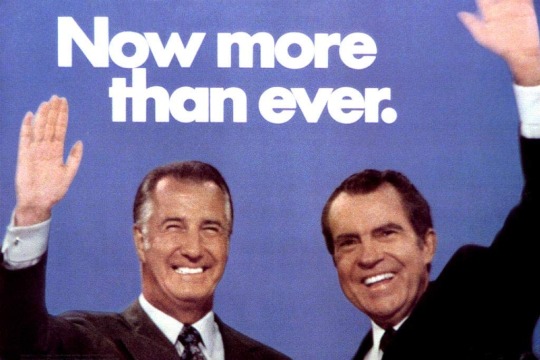
102 notes
·
View notes
Text
Legacy media gatekeepers are losing their grip on the public conversation and they don’t like it, even if they mostly deserve it. That’s one of the reasons Vice President J.D. Vance’s speech at the Munich Security Conference was as well received by the successors to Spiro Agnew’s favorite scribes as a nationwide ban on free WiFi in press filing centers.
In the past, the default position of most in the media would be to at least grudgingly find a kindred spirit in a public figure who delivers a defense of free speech, even if they dislike the person who delivered the message or find them a flawed messenger for the First Amendment and the Fourth Estate.
The trouble is that a nontrivial number of influential media figures no longer see themselves in such appeals to free speech, especially when a conservative political leader takes up the mantle. They see their competitors and, more charitably, the purveyors of wrongthink against whom they are the last line of defense.
This was apparent in the much-maligned question by Margaret Brennan of CBS News in which she blamed the Nazis’ “weaponization” of free speech for the Holocaust. While many have disputed the historical accuracy of her premise, she is also assuming that the anti-free speech laws in Europe can only regulate bad people, not urbane arbiters of which fruits are apples or bananas like herself.
These questions are now being debated at the highest levels of our government. “Democracy rests on the sacred principle that the voice of the people matters,” Vance said in Europe. “There is no room for firewalls. You either uphold the principle or you don’t.”
9 notes
·
View notes
Text
A United States president has left office before completing his term nine times. Four deaths from natural causes, four assassinations, and one resignation.
John Tyler assumed the presidency after William Henry Harrison died shortly after inauguration, but was not re-elected four years later, so he was only elected to the vice presidency.
Millard Fillmore assumed the presidency after Zachary Taylor died, but was not re-elected so he was only elected to the vice presidency.
Andrew Johnson assumed the presidency after Abraham Lincoln was assassinated, but was not re-elected so he was only elected to the vice presidency.
Chester Arthur assumed the presidency after James Garfield was assassinated, but was not re-elected so he was only elected to the vice presidency.
Theodore Roosevelt assumed the presidency after William McKinley was assassinated and was later elected to another term.
Calvin Coolidge assumed the presidency after Warren G. Harding died and was later elected to another term.
Harry Truman assumed the presidency after Franklin D. Roosevelt died and was later elected to another term.
Lyndon Johnson assumed the presidency after John F. Kennedy was assassinated and was later elected to another term.
Gerald Ford assumed the presidency after Richard Nixon resigned and was not re-elected. Ford was also never elected vice president, he was appointed to the position after Nixon's previous vice president, Spiro Agnew, resigned.
Four presidents were elected vice president but not president and one was never elected to either.
14 notes
·
View notes
Text
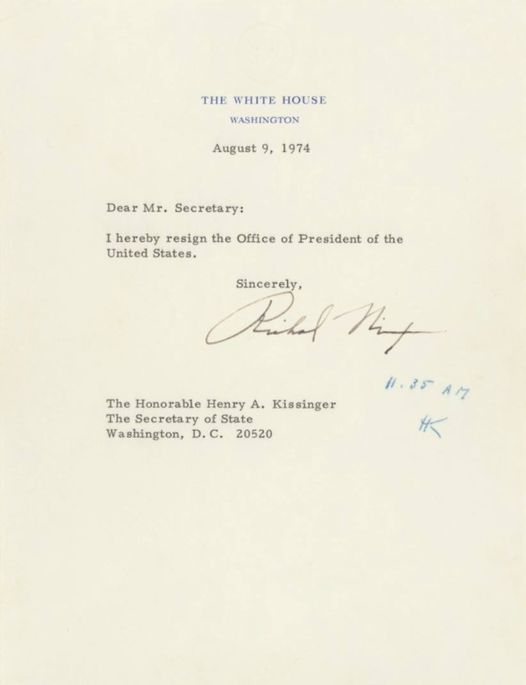
LETTERS FROM AN AMERICAN
August 8, 2024
Heather Cox Richardson
Aug 09, 2024
Fifty years ago, on August 9, 1974, Richard M. Nixon became the first president in U.S. history to resign.
The road to that resignation began in 1971, when Daniel Ellsberg, who was at the time an employee of the RAND Corporation and thus had access to a top-secret Pentagon study of the way U.S. leaders had made decisions about the Vietnam War, leaked that study to major U.S. newspapers, including the New York Times and the Washington Post.
The Pentagon Papers showed that every president from Harry S. Truman to Lyndon B. Johnson had lied to the public about events in Vietnam, and Nixon worried that “enemies” would follow the Pentagon Papers with a leak of information about his own decision-making to destroy his administration and hand the 1972 election to a Democrat.
The FBI seemed to Nixon reluctant to believe he was being stalked by enemies. So the president organized his own Special Investigations Unit out of the White House to stop leaks. And who stops leaks? Plumbers.
The plumbers burglarized the office of Ellsberg’s psychiatrist in California, hoping to find something to discredit him, then moved on to bigger targets. Together with the Committee to Re-elect the President (fittingly dubbed CREEP as its activities became known), they planted fake letters in newspapers declaring support for Nixon and hatred for his opponents, spied on Democrats, and hired vendors for Democratic rallies and then scarpered on the bills. Finally, they set out to wiretap the Washington, D.C., headquarters of the Democratic National Committee, in the fashionable Watergate office complex.
Early in the morning of June 17, 1972, Watergate security guard Frank Wills noticed that a door lock had been taped open. He ripped off the tape and closed the door, but on his next round, he found the door taped open again. Wills called the police, who arrested five men ransacking the DNC’s files.
The White House immediately denounced what it called a “third-rate burglary attempt,” and the Watergate break-in gained no traction before the 1972 election, which Nixon and Vice-President Spiro Agnew won with an astonishing 60.7% of the popular vote.
But Bob Woodward and Carl Bernstein, two young Washington Post reporters, followed the sloppy money trail back to the White House, and by March 1973 the scheme was unraveling. One of the burglars, James W. McCord Jr., wrote a letter to Judge John Sirica before his sentencing claiming he had lied at his trial to protect government officials. Sirica made the letter public, and White House counsel John Dean immediately began cooperating with prosecutors.
In April, three of Nixon’s top advisors resigned, and in May the president was forced to appoint former solicitor general of the United States Archibald Cox as a special prosecutor to investigate the affair. That same month, the Select Committee on Presidential Campaign Activities, informally known as the Senate Watergate Committee, began nationally televised hearings. The committee’s chair was Sam Ervin (D-NC), a conservative Democrat who would not run for reelection in 1974 and thus was expected to be able to do the job without political grandstanding.
The hearings turned up the explosive testimony of John Dean, who said he had talked to Nixon about covering up the burglary more than 30 times, but there the investigation sat during the hot summer of 1973 as the committee churned through witnesses. And then, on July 13, 1973, deputy assistant to the president Alexander Butterfield revealed the bombshell news that conversations and phone calls in the Oval Office had been taped since 1971.
Nixon refused to provide copies of the tapes either to Cox or to the Senate committee. When Cox subpoenaed a number of the tapes, Nixon ordered Attorney General Elliot Richardson to fire him. In the October 20, 1973, “Saturday Night Massacre,” Richardson and his deputy, William Ruckelshaus, refused to execute Nixon’s order and resigned in protest; it was only the third man at the Justice Department—Solicitor General Robert Bork—who was willing to carry out the order firing Cox.
Popular outrage at the resignations and firing forced Nixon to ask Bork—now acting attorney general—to appoint a new special prosecutor, Leon Jaworski, a Democrat who had voted for Nixon, on November 1. On November 17, Nixon assured the American people that “I am not a crook.”
Like Cox before him, Jaworski was determined to hear the Oval Office tapes. He subpoenaed a number of them. Nixon fought the subpoenas on the grounds of executive privilege. On July 24, 1974, in U.S. v. Nixon, the Supreme Court sided unanimously with the prosecutor, saying that executive privilege “must be considered in light of our historic commitment to the rule of law. This is nowhere more profoundly manifest than in our view that 'the twofold aim (of criminal justice) is that guilt shall not escape or innocence suffer.'... The very integrity of the judicial system and public confidence in the system depend on full disclosure of all the facts….”
Their hand forced, Nixon’s people released transcripts of the tapes. They were damning, not just in content but also in style. Nixon had cultivated an image of himself as a clean family man, but the tapes revealed a mean-spirited, foul-mouthed bully. Aware that the tapes would damage his image, Nixon had his swearing redacted. “[Expletive deleted]” trended.
In late July 1974, the House Committee on the Judiciary passed articles of impeachment, charging the president with obstruction of justice, abuse of power, and contempt of Congress. Each article ended with the same statement: “In all of this, Richard M. Nixon has acted in a manner contrary to his trust as President and subversive of constitutional government, to the great prejudice of the cause of law and justice and to the manifest injury of the people of the United States. Wherefore Richard M. Nixon, by such conduct, warrants impeachment and trial, and removal from office.”
And then, on August 5, in response to a subpoena, the White House released a tape recorded on June 23, 1972, just six days after the Watergate break-in, that showed Nixon and his aide H.R. Haldeman plotting to invoke national security to protect the president. Even Republican senators, who had not wanted to convict their president, knew the game was over. A delegation went to the White House to deliver the news to the president that he must resign or be impeached by the full House and convicted by the Senate.
In his resignation speech, Nixon refused to acknowledge that he had done anything wrong. Instead, he told the American people he had to step down because he no longer had the support he needed in Congress to advance the national interest. He blamed the press, whose “leaks and accusations and innuendo” had been designed to destroy him. His disappointed supporters embraced the idea that there was a “liberal” conspiracy, spearheaded by the press, to bring down any Republican president.
LETTERS FROM AN AMERICAN
HEATHER COX RICHARDSON
#Letters From An American#Heather cox Richardson#Nixon#history#American History#the presidency#Watergate
24 notes
·
View notes
Note
sticking to pre-2000: why were incompetent oafs, e.g. Agnew, chosen for the tail of the ticket?
Agnew was a top-notch hatchet man who was perfectly willing to attack anybody and blow every dog whistle, so he came in handy during the 1968 campaign and early years of the Nixon Administration. He actually was quite popular with Nixon supporters. Nixon also recognized that, comparatively, Agnew made him look like a statesman. Nixon and his top aides saw Vice President Agnew as impeachment insurance -- even if Nixon screwed up, they realized that Congress had no interest in seeing Agnew assume the Presidency.
Unfortunately for Nixon, Agnew was a literal criminal, so when the Vice President was indicted and facing potential prison time there was no way for him to remain in the Administration and he had to resign. So, when Nixon did screw up, he no longer had his impeachment insurance and instead had a Vice President (Gerald Ford) who was practically universally respected in Washington.
Not all Vice Presidents before 2000 were "incompetent oafs", but the job sucked until the last half of the 20th Century when Presidents started giving VPs some real responsibilities within their Administrations. Most of the VPs after World War II have been respected politicians with extensive experience in government. The exceptions, in my opinion, would be Agnew (even though he was Governor of Maryland, it was only for two years) and Dan Quayle (who had served in both the House and Senate but was considered a joke even when he was first nominated for VP in 1988). But the Vice Presidency has been a more influential position over the last 50 years, so present-day VPs usually aren't stiffs who have no relationship with the President they serving under. In the past, Vice Presidential nominees were frequently chosen to help balance the ticket regionally or ideologically, or to placate certain wings of the respective political parties. Fortunately, recent VP nominees are thoroughly vetted and usually chosen because they are seen as being fully capable of assuming the Presidency at a moment's notice, if necessary. Of course, there are still recent exceptions to that rule, as well.
#History#Presidents#Presidency#Vice Presidents#Vice Presidency#Presidential Elections#Presidential Politics#Presidential Campaigns#Politics#Elections#Vice Presidential nominees#Spiro Agnew#Vice President Agnew#Richard Nixon#President Nixon#Nixon Administration#Resignation of Spiro Agnew
24 notes
·
View notes
Text

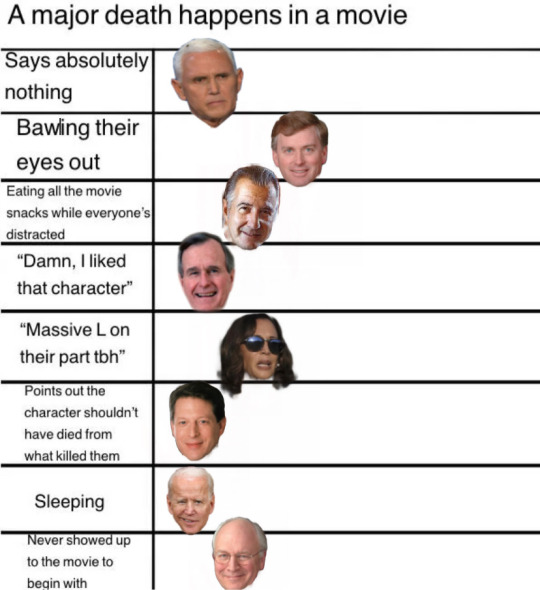
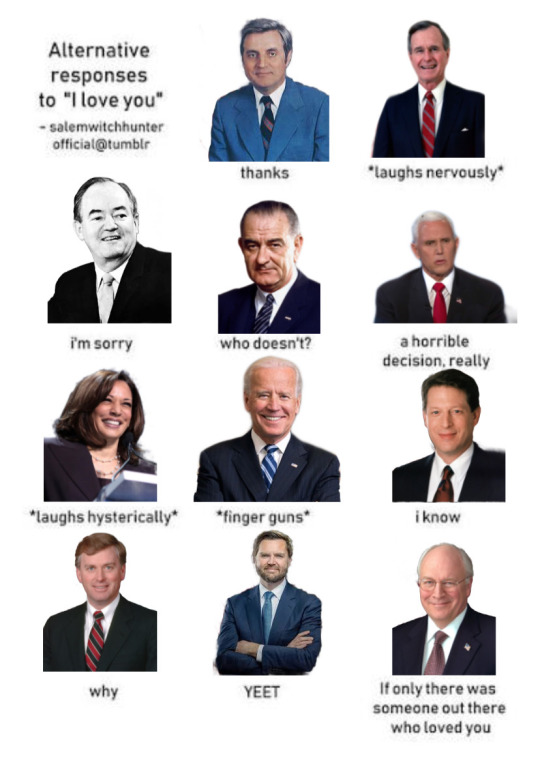
More VP meme things
#vice presidency#al gore#dan quayle#joe biden#dick cheney#kamala harris#mike pence#jd vance#walter mondale#spiro agnew#hubert humphrey#lyndon b. johnson#george hw bush
23 notes
·
View notes
Text
watching the moon landing with my family and annoying them by telling them about former vice president spiro agnew's political scandal that caused him to resign because he was mentioned. if anyone wondered what its like living with me
#''and it happened while the moon landing was going on?'' ''no it was years later'' ''why are you making us listen to this now then''#rude. just trying to spread awareness of something that happened thirty years before i was born#micah.txt
13 notes
·
View notes
Text
Legacy media gatekeepers are losing their grip on the public conversation and they don’t like it, even if they mostly deserve it. That’s one of the reasons Vice President J.D. Vance’s speech at the Munich Security Conference was as well received by the successors to Spiro Agnew’s favorite scribes as a nationwide ban on free WiFi in press filing centers.
In the past, the default position of most in the media would be to at least grudgingly find a kindred spirit in a public figure who delivers a defense of free speech, even if they dislike the person who delivered the message or find them a flawed messenger for the First Amendment and the Fourth Estate.
4 notes
·
View notes
Text
Skylanders Academy Six
(You guys have no idea how much self restraint I needed to not use the latin number again. I am also not responsible if you decide to look up what latin six is.)
Season 1 Episode 6 - Space Invaders
-Weird to me that in this episode, Golden Queen and Kaossandra seem to be on good terms, but in a few episodes, they're only allies of convince, and nothing more. I suppose Golden Queen would stab any back to get what she wants, but shouldn't Kaossandra know enough of that to keep her at an further distance? I'll explain why I think they're closer than just people who see each other at 'Soulless Cycle' (an evil clothing store if I had to guess) occasionally around... geez, all the way in near the end of Season 2 in Sheep(ball) Dreams.
-This might be a long shot, but I think Spyro's middle name being Agnew (or at least Eruptor thinking it is) is a reference to Spiro Agnew, a former USA vice president, and also the first result when I looked up what the hell Agnew is.
-Kaos meditating seems practically inconceivable, but his floating head illusion was a staple of Skylanders Spyro's Adventure! Too bad he doesn't have the Evil Skylanders (well, they're actually called Kaos's Minions, but nobody would know what I'm talking about if I just said that) to go along with it.
-Weird that Jet Vac is so... carefree during their camping trip. He's usually the one policing all the fun and trying to stick exactly to the word of the mission. Maybe with Eon around he feels he doesn't have to be so uptight?
-Eruptor cooks his marshmallow... like a normal person? You'd think that he'd burn it, being made of fire and all. Wait, how is he even holding that stick?
-After 314... 318... loses, Kaos finally gets a win, and kills a Skylander! I wish my persistence was that good. Then again, it's not like this victory lasts.
-It might seem callous that Jet Vac immediately sought to replace Stealth Elf, but considering that the entire fate of the Skylands is up to the Skylanders, it may have been completely necessary for him to do so in past teams. He definitely takes a bit too far here by trying to get someone who acts just like her.
-I can't believe Glumshanks believes in alpha males. He really is just as evil as his boss. Wolfgang isn't even the leader of the group! If anyone is the 'alpha' of the 'pack', it's the Golden Queen. No amount of toxic masculinity is going to beat her.
-Too bad that once Elf takes control, we don't get anything else out of Kaos until she's freed. Could've had him fight for control, or something.
-Given that Eon's beard holds much of his powers, something mentioned in Beard Science, it's a very good thing he didn't shave it. It's also quite a drastic act, as I'm sure Stealth Elf is far from the first Skylander to die on duty.
#skylanders#skylanders academy#space invaders#should I also add the episode number in the tags?#no i think that's overkill#review#my thoughts#beep's skylander review
4 notes
·
View notes
Text

AGNEW: (verb) To bounce back into your face. -- MAD magazine, 1978
There's something genuinely ironic about Spiro Agnew, the vice president to the formerly most corrupt president, having a boardgame about American history.
In 1968, Richard M. Nixon selected Agnew to be his vice presidential running mate. Agnew quickly developed a reputation for strong polemical speeches critical of the antiwar movement, the media, and liberals. On October 10, 1973, after pleading “no contest” to a charge of income tax evasion connected with kickbacks he received during his tenure as Maryland’s governor, Agnew resigned as Vice President – only the second vice president ever to resign and the first to leave office because of legal problems. Agnew was disbarred in 1974.
The game out in 1971, two years before the shit hit the fan.
12 notes
·
View notes